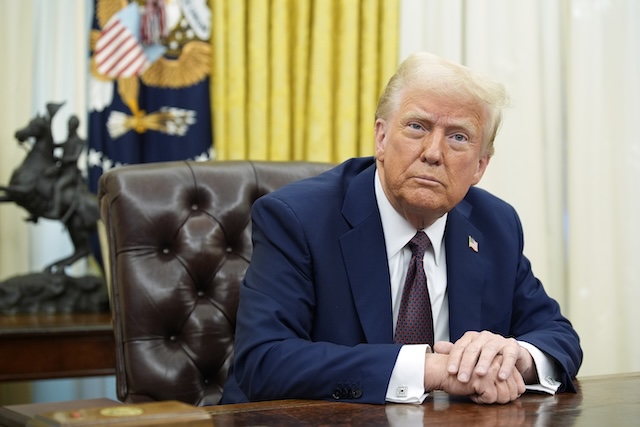Commentary: What a trial 300 years ago tells us about Trump’s media lawsuits
Published 2:24 pm Tuesday, April 22, 2025

- President Donald Trump signs executive orders in the White House in Washington, D.C., in January. (Yuri Gripas/Abaca Press/TNS)
President Donald Trump’s lawsuit against CBS News reminded me of a famous legal case that I teach my journalism students each semester at Boise State University.
It’s known as the Zenger trial.
The case was in 1735, nearly 300 years ago, before the United States was even a country.
Then-New York Gov. William Cosby charged the New-York Weekly Journal printer John Peter Zenger with “seditious libel” because the newspaper was critical of Cosby, accusing him of tyranny and violating the people’s rights.
Seditious libel at the time simply meant you were critical of the government, even if what you wrote was true. The plaintiff did not have to prove that the published material was false, as plaintiffs have to do today.
On its face, Zenger was guilty, simply on the basis that he indeed printed the material.
Despite that and despite Cosby’s repeated efforts to stack the court with lawyers, judges and jurors in his favor, the jury returned a verdict of not guilty — after just 10 minutes of deliberation.
Essentially, the jury said, “Yeah, we know he did this and it’s against the law, but it shouldn’t be, and he shouldn’t be punished for it.”
It’s remarkable to me that a jury of average people in 1735 in a British province recognized the importance of allowing the press to criticize the government without fear of retribution.
“I think it was reflective of the deep commitment that existed among these ordinary jurors that the right to criticize their colonial governor was essential in their society,” University of Minnesota media ethics and law Professor Jane Kirtley told me in a phone interview. “Criticism is the lifeblood of what keeps a democratic society functioning and helps to hold those in power accountable.”
The Zenger case didn’t set legal precedent, but it was foundational in our understanding of the freedom of the press and the importance of protecting the free exercise of journalism.
As we all know, freedom of the press was enshrined in the First Amendment of the Constitution, its roots found some 50 years earlier in the Zenger trial.
Trump is suing CBS News for $20 billion over claims that the news program “60 Minutes” edited an interview with Kamala Harris to make her look good just before the election. (The accusation is ridiculous; “60 Minutes” used a more succinct answer from Harris to a question about Israel.)
It’s interesting, though, that Trump is not suing CBS News on the grounds of libel; he’s suing under the Texas Deceptive Trade Practices-Consumer Protection Act, which is meant to regulate deceptive advertising. And he filed it in Texas in a district whose lone judge is a Trump appointee, under the guise that a Texas congressman was harmed by the “60 Minutes” interview.
It’s worth noting that in the Zenger case, Cosby had removed New York’s Chief Judge Lewis Morris after Morris ruled against Cosby in a case involving Cosby’s salary as governor and hinged on, essentially, separation of powers.
Sound familiar? Trump has regularly attacked judges and threatened to remove those who don’t rule in his favor.
It’s also worth noting that just as Trump is using the regulatory powers of the FCC to violate CBS News’ First Amendment protections, Cosby also sought to use his regulatory powers to attack the New-York Weekly Journal, including ordering a hangman to burn copies of the newspaper.
By doing such things as suing media outlets, canceling subscriptions to Politico, threatening funding to NPR and PBS, barring the Associated Press from the Oval Office or refusing to answer questions from reporters who list their pronouns, Trump’s attacks on the media are just as petty and just as anathema to American values as then-Gov. William Cosby’s actions back in the early 1700s.
Scott McIntosh is the Idaho Statesman opinion editor.







